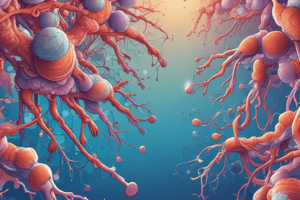Podcast
Questions and Answers
What is one way to optimize in vivo production of hybridomas?
What is one way to optimize in vivo production of hybridomas?
- Increasing the invasive nature of the cell line
- Changing the injection site to tail vein instead of peritoneal cavity
- Selecting appropriate clones (correct)
- Using more mice for each production run
Why are in vitro methods preferred for large-scale production by the pharmaceutical industry?
Why are in vitro methods preferred for large-scale production by the pharmaceutical industry?
- Utilizing more mice for antibody production
- Avoiding the need for submission of animal protocols
- Requirement of more laboratory personnel experienced in animal handling
- Ease of culture for production compared to animal use (correct)
What is a disadvantage of in vitro methods for hybridoma production?
What is a disadvantage of in vitro methods for hybridoma production?
- No need for laboratory personnel experienced in animal handling
- Use of human serum instead of Fetal Bovine Serum (FBS)
- Loss of proper glycosylation that might make the antibody unsuitable for in vivo experiments (correct)
- Hybridomas grow better in culture than in vivo
Why might some hybridomas not grow well in culture?
Why might some hybridomas not grow well in culture?
What impact does the loss of proper glycosylation of antibodies have on their use?
What impact does the loss of proper glycosylation of antibodies have on their use?
Why do in vitro methods require the use of Fetal Bovine Serum (FBS)?
Why do in vitro methods require the use of Fetal Bovine Serum (FBS)?
What type of cell culture systems allow only low-density cell culture?
What type of cell culture systems allow only low-density cell culture?
Which step involves the fusion of myeloma cells with immune spleen cells in hybridoma technology?
Which step involves the fusion of myeloma cells with immune spleen cells in hybridoma technology?
Which cells are used in the production of antibodies in hybridoma technology?
Which cells are used in the production of antibodies in hybridoma technology?
In hybridoma technology, what type of cell line is capable of producing one type of antibody protein for a long period?
In hybridoma technology, what type of cell line is capable of producing one type of antibody protein for a long period?
What type of cancer forms in a type of white blood cell called a plasma cell?
What type of cancer forms in a type of white blood cell called a plasma cell?
Which step involves the preparation of myeloma cells in hybridoma technology?
Which step involves the preparation of myeloma cells in hybridoma technology?
What is the definition of polykaryocytes as mentioned in the text?
What is the definition of polykaryocytes as mentioned in the text?
How are fully human monoclonal antibodies (mAbs) produced?
How are fully human monoclonal antibodies (mAbs) produced?
What is the main application of monoclonal antibodies mentioned in the text?
What is the main application of monoclonal antibodies mentioned in the text?
Which of the following is NOT one of the top three grossing antibodies used in oncology as per the text?
Which of the following is NOT one of the top three grossing antibodies used in oncology as per the text?
How did antibodies obtained from human placentas contribute to medical advancements in the late 1930s?
How did antibodies obtained from human placentas contribute to medical advancements in the late 1930s?
Which process empowers the production of fully human monoclonal antibodies?
Which process empowers the production of fully human monoclonal antibodies?
Flashcards are hidden until you start studying
Study Notes
In Vivo Production
- Optimal in vivo production requires reducing the invasive nature of a cell line to ensure all mice survive a production run
- Selecting appropriate clones and altering hybridoma cell concentration injected into the peritoneal cavity of the mice can optimize production
Advantages of In Vitro Methods
- Reduce the use of mice at the antibody-production stage
- Preferred method for large-scale production in the pharmaceutical industry due to ease of culture and economic considerations
- Avoids the need to submit animal protocols
- Decreases the need for laboratory personnel experienced in animal handling
Disadvantages of In Vitro Methods
- Some hybridomas do not grow well in culture or are lost in culture
- Requires the use of Fetal Bovine Serum (FBS), limiting some antibody uses
- Loss of proper glycosylation of the antibody, making it unsuitable for in vivo experiments due to increased immunogenicity, reduced binding affinity, changes in biologic functions, or accelerated clearance in vivo
Hybridoma Technology
- Production of monoclonal antibodies involves in vivo or in vitro procedures or combinations thereof
- Generation of mAb-producing cells requires the use of animals, usually mice
- The procedure yields a cell line capable of producing one type of antibody protein for a long period
Steps in Producing Hybridoma Cells
- Immunization of mice and selection of mouse donors
- Screening of mice for antibody
- Preparation of myeloma
- Fusion of myeloma cells with immune spleen cells
- Cloning of hybridoma cell lines
In Vitro Production Systems
- Commercial in vitro systems can be split into two types: single-compartment and double-compartment systems
- Double-compartment systems allow high-density cell culture, resulting in increased mAb concentration
Applications of Monoclonal Antibodies
- Can be used to detect or purify substances
- Effective in the treatment of diseases, such as malignancies
- Examples of monoclonal antibodies used in oncology include bevacizumab, trastuzumab, and rituximab
- Historical use in preventing or treating measles, mumps, poliomyelitis, hepatitis, and pertussis
Studying That Suits You
Use AI to generate personalized quizzes and flashcards to suit your learning preferences.




